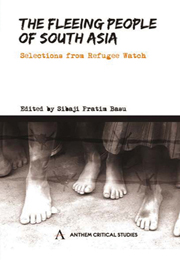Book contents
- Frontmatter
- Contents
- Acronyms and Abbreviations
- Foreword by Ranabir Samaddar
- Preface
- ETHICAL ISSUES
- LAWS
- SOUTH ASIA
- INDIA
- GENDER
- INTERVIEW/CORRESPONDENCE
- Introduction
- Voices from Exile – 1
- Voices from Exile – 2
- Daughter of Isis
- Right of Return
- Letters from a Palestinian Refugee Camp
- REPRESENTATIONS
- Index
Voices from Exile – 1
from INTERVIEW/CORRESPONDENCE
Published online by Cambridge University Press: 05 March 2012
- Frontmatter
- Contents
- Acronyms and Abbreviations
- Foreword by Ranabir Samaddar
- Preface
- ETHICAL ISSUES
- LAWS
- SOUTH ASIA
- INDIA
- GENDER
- INTERVIEW/CORRESPONDENCE
- Introduction
- Voices from Exile – 1
- Voices from Exile – 2
- Daughter of Isis
- Right of Return
- Letters from a Palestinian Refugee Camp
- REPRESENTATIONS
- Index
Summary
Just before the conclusion of the agreement on the Chittagong Hill Tracts (CHT), Sabyasachi Basu Ray Chaudhury visited refugee camps in South Tripura and had an extensive interview with Mr Upendralal Chakma, president, Jumma Refugee Welfare Association. In this interview, Mr Chakma expresses his opinion on different issues related to the situation in the CHT, Bangladesh. Here is an excerpt of this exclusive interview.
Refugee Watch (RW): After 50 years of partition of the Indian subcontinent, how would you relate the CHT problem to that of partition? Do you think that the partition on the whole created the problem?
Upendralal Chakma (UC): In 1947, 97.5 per cent of the total population of the CHT were Jummas and the remaining 2.5 per cent were non-Jummas. Logically, the Jumma people expected that their region would be merged with India. The Jumma leaders were working hard in that order. They met different political leaders at that juncture. Our leaders placed their demands before the visiting sub-commission that the CHT should be made a part of the new nation of India. But, on 18 August, we heard on radio that the CHT has been included in Pakistan. Our leaders talked to the Indian leaders. While the new Prime Minister of India, Pandit Jawaharlal Nehru did not take the matter seriously, Sardar Ballavbhai Patel showed keen interest in the entire issue at the point. Nevertheless, there was no attempt to resist the unjust treatment of the CHT and we were included in Pakistan.
- Type
- Chapter
- Information
- The Fleeing People of South AsiaSelections from Refugee Watch, pp. 371 - 374Publisher: Anthem PressPrint publication year: 2009



